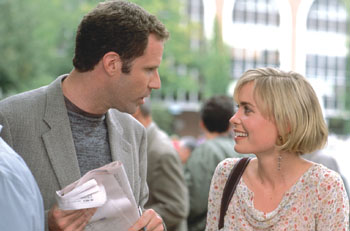![[Metroactive Movies]](/movies/gifs/movies468.gif)
[ Movies Index | Show Times | Silicon Valley | Metroactive Home | Archives ]

Will's Way: Radha Mitchell latches on to a puppyish Will Ferrell in 'Melinda and Melinda.' Half Lives Woody Allen returns to form in two-sided tragic comedy 'Melinda and Melinda' HE IS once again recording the dithering of affluent New Yorkers, but in Melinda and Melinda the nigh-70-year-old Woody Allen also has something substantial to mull over. Allen's 33 1/3rd film represents a giant step away from the abyss of his last, Anything Else, in which Allen was reduced to taking second billing under Christina Ricci. Melinda and Melinda opens at a bistro table. Sy, a celebrated comedy playwright (Wallace Shawn, most cherubic), is having a cordial dispute with tragedian Max (Larry Pine). Their subject: Is the nature of life essentially comic or tragic? The question has been mulled over in terms as varied as Pascal's idea that life is a comedy with a bloody finish and that useful definition by Allen's old colleague Mel Brooks: "Tragedy is what happens to me; comedy is what happens to you." Both the humorist and the tragedian embellish the slender outline of a story. A strange woman shows up unannounced at a dinner party at which her more successful best friends from college are dining. In the tragic version, Melinda (Radha Mitchell) arrives filthy and exhausted after a Greyhound ride from the Midwest. Her appearance adds a load of trouble to the already wobbly marriage of the rising indie-movie director Laurel (Chloé Sevigny) and her husband, a falling actor named Lee (Jonny Lee Miller). After having ruined her life for love, the hard-drinking Melinda is falling in love with a too-smooth jazz pianist (Chiwetel Ejiofor); he is called Ellis Moonsong, and those with a little French will think, "Moonsong is derived from mensonges, 'lies.'" It's an affair doomed to end badly. In the other wing of the film, the same story is replayed. This time, the disappointed husband is now puppyishly inept and even has a dog's name: Hobie (Will Ferrell). His wife, Susan (Amanda Peet), is incubating a low-budget film called The Castration Sonata. Into this troubled flat comes the uninvited Melinda—this time a sillier girl—who shows up with a bellyful of sleeping pills. Allen shuffles between the two halves, linked with devices that turn up in both versions: romance with a pianist, a magic lamp that brings tragedy when it answers one prayer, farce when it answers another. This dual role of an intruder is perfect for Mitchell. As the angry, ignored Mrs. Barry in Finding Neverland or as the intern seduced and exposed in High Art, Mitchell always seems to be fighting down a hot flush of embarrassment. Mitchell is the antithesis of slick and a much more subtle actress than her look-alike, Charlize Theron. This is Mitchell's best work; Allen gives her a chance to work a range from burbling wreck to a modern Emma Bovary. Over the decades, Allen has presented himself as a director fated to make people laugh—recall the flying-saucer aliens in Stardust Memories telling him that they liked his "early funny" movies better. Sy and Max's reductive argument that life is either a comedy or a tragedy is defeated by the comic notes that come up in the sad-Melinda's tale. The highfalutin talk of the upper class at the party, the references to Bartok and Mahler dropping like lead balloons, may be deliberately meant by Allen to set a tone. Unlike in his serious films (such as Interiors, Another Woman or September), in Melinda and Melinda, Allen is more conscious of the artificiality of the intellectual pose. It is a story told from the beginning, in quotation marks. And yet the comedy pleases me more. Hiring Ferrell was an inspiration. Maybe you had to be Allen to perceive Ferrell's talent despite his previous choice of material. Picking up on Allen's mannerisms crushes some actors—do the lines automatically bring out Allenisms or is it hypnosis (or maybe intimidation)? In Ferrell's large body and baby face, Allen implants a Bob Hope prissiness. Ferrell is damned funny. Hobie pops his glassy, doll-like eyes as he reaches for memories of former little-theater greatness, working a running gag about his one-size-fits-all approach to acting. Miraculously, the gag never runs out of steam. Even more satisfying is Allen's age-old ease with romantic comedy. For instance, he includes a superb meet-cute over a piano left on a sidewalk by the moving men. Allen successfully has it both ways here, harmonizing his love of the new world of showbiz and the old world of German/Scandinavian somberness. It is as the tragic Melinda murmurs, in what sounds like a new-minted version of an old movie saw: Tears of sorrow and tears of joy are exactly the same thing. I wasn't driven to tears by the film, but by laughter. And after Anything Else (even the terrible title sounded like a swan song), it's very moving that Allen could put it together one more time.
Melinda and Melinda (PG-13; 99 min.), directed and written by Woody Allen, photographed by Vilmos Zsigmond and starring Will Ferrell, Radha Mitchell, Chiwetel Ejiofor, Jonny Lee Miller, Wallace Shawn, Larry Pine and Chloé Sevigny, plays at selected theaters.
Send a letter to the editor about this story to letters@metronews.com. [ Silicon Valley | Metroactive Home | Archives ]
|
From the March 23-29, 2005 issue of Metro, Silicon Valley's Weekly Newspaper.
Copyright © Metro Publishing Inc. Metroactive is affiliated with the Boulevards Network.
For more information about the San Jose/Silicon Valley area, visit sanjose.com.